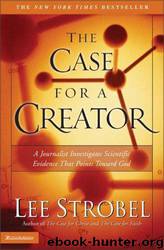The Case For A Creator by Lee Strobel

Author:Lee Strobel
Language: eng
Format: mobi, epub
Published: 2012-01-03T16:45:26+00:00
THE EVIDENCE OF BIOCHEMISTRY: THE COMPLEXITY OF MOLECULAR MACHINES
We have always underestimated the cell.... The entire cell can be viewed as a factory that contains an elaborate network of interlocking assembly lines, each of which is composed of a set of large protein machines.... Why do we call [them] machines? Precisely because, like machines invented by humans to deal efficiently with the macroscopic world, these protein assemblies contain highly coordinated moving parts.
Bruce Alberts, President, National Academy of Sciences
We should reject, as a matter of principle, the substitution of intelligent design for the dialogue of chance and necessity; but we must concede that there are presently no detailed Darwinian accounts of the evolution of any biochemical system, only a variety of wishful speculations.
Biochemist Franklin M. Harold
Michael Behe was taught in parochial school that God had set up the universe, knew what was going to happen, and intended for life to come into existence, but from our perspective the entire process unfolded through Darwinian evolution. And that pretty much satisfied the young Behe.
Later as a student in biochemistry, when Behe would encounter enormously complicated biological systems, his response was to scratch his head and say, "Gee, I wonder how evolution created that? Well, somebody must know!" He always moved on, assuming someone did.
Then one day, while doing post-doctorate research on DNA at the National Institutes of Health, he and a colleague were pondering what it would take for life to begin by naturalistic processes. As they enumerated the components that would be needed-proteins, a genetic code, a membrane, and so on-they looked at each other and said, "Naaaaahhhhhh!" They knew there was no way life could have sprung into existence unaided. Seeds of skepticism were planted.
Subsequently, he read geneticist Michael Denton's groundbreaking book Evolution: A Theory in Crisis. For the first time, Behe was exposed to a well-reasoned scientific critique of
Darwinismand he was astounded. Until then, he only knew of "religious nuts" who doubted Darwin. Now, here was a thoughtful, agnostic scientist who was powerfully challenging whether Darwin's mechanism of natural selection could really explain how life started and developed through the ages.
Spurred on by Denton's book, Behe began scouring the scientific literature in search of the detailed Darwinian explanations he had always assumed were there. Time after time, he found scientists describing complex, interlocking biological systems and basically saying, "Isn't it wonderful how natural selection put this together?" The how was always missing.
That's when Behe realized that as a biochemist, he was perfectly situated to investigate whether the evidence points toward Darwinism or God as the source for living organisms. After all, life is essentially a molecular phenomenon. If Darwinian evolution is going to work, it has to succeed at the microscopic level of amino acids, proteins, and DNA. On the other hand, if there really was a designer of the world, then his fingerprints were going to be all over the cell.
And the cell is Behe's world-an incredible, intricate, Lilliputian world where a typical cell takes ten million million atoms to build.
Download
This site does not store any files on its server. We only index and link to content provided by other sites. Please contact the content providers to delete copyright contents if any and email us, we'll remove relevant links or contents immediately.
The Lost Art of Listening by Michael P. Nichols(6481)
Why I Am Not A Calvinist by Dr. Peter S. Ruckman(3773)
The Rosicrucians by Christopher McIntosh(3054)
Wicca: a guide for the solitary practitioner by Scott Cunningham(2709)
Signature in the Cell: DNA and the Evidence for Intelligent Design by Stephen C. Meyer(2505)
Real Sex by Lauren F. Winner(2480)
The Holy Spirit by Billy Graham(2425)
To Light a Sacred Flame by Silver RavenWolf(2356)
The End of Faith by Sam Harris(2295)
The Gnostic Gospels by Pagels Elaine(2032)
Nine Parts of Desire by Geraldine Brooks(2010)
Waking Up by Sam Harris(1962)
Heavens on Earth by Michael Shermer(1957)
Devil, The by Almond Philip C(1906)
Jesus by Paul Johnson(1892)
The God delusion by Richard Dawkins(1853)
Kundalini by Gopi Krishna(1827)
Chosen by God by R. C. Sproul(1766)
The Nature of Consciousness by Rupert Spira(1692)
